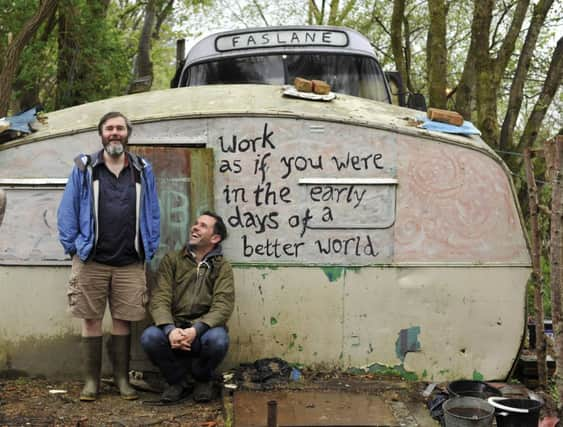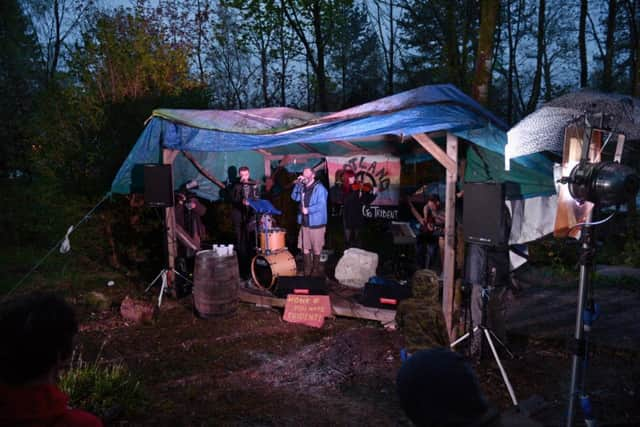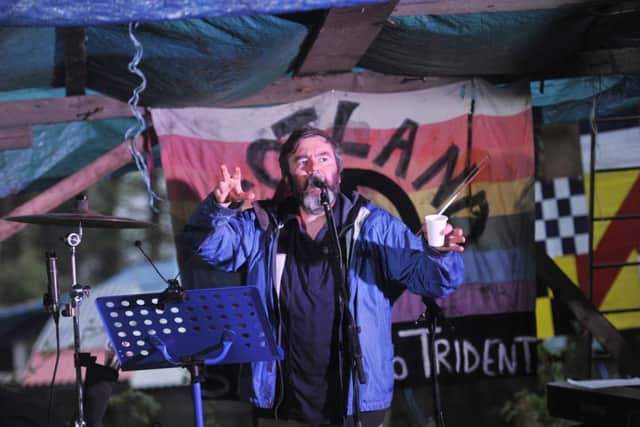Exploring Scotland’s songwriting and oral traditions


Kids play in the mud, remarkably astute dogs mark their territory on a stool made from an old toilet seat and there’s a man with an acoustic guitar. The atypical venue for this mini pop-up festival is Faslane Peace Camp, a colourful anti-conurbation of caravans and gardens located close by the gates of Her Majesty’s Naval Base Clyde.
Anti-Trident campaigners have lived here or hereabouts since 1982, peacefully opposing the nuclear deterrent across the road. A week before Moffat and friends descend for the night, two protesters succeeded in boarding one of the submarines at the base. Even they were surprised they made it that far.
Advertisement
Hide AdThe camp’s “honk if you hate Trident” sign, usually positioned by the roadside, has been appropriated and propped up in front of the stage, which is little more than a lean-to draped in tarpaulin. It’s a tight squeeze even for Moffat’s modest set-up but, once the leaks are dealt with, the makeshift set-up suits his purposes perfectly. Despite the clever crafting of his ribald rhyming couplets, there is a colloquial immediacy about the material Moffat has written for this tour, whether he is adapting traditional songs for 21st-century ears or writing originals in the straight-talking spirit of his forebears.


Moffat first approached Fegan with the notion of a ceilidh-style tour years ago, where attendees could get up and do a turn – “like Scotland’s Got Talent,” Moffat suggests. With Commonwealth Games Culture 2014 funding, the idea took more ambitious shape, acquiring a title, Where You’re Meant To Be, a band comprising guitarist Stevie Jones, violinist Jenny Reeve and Twilight Sad’s James Graham on backing vocals, and a documentary element, courtesy of Fegan and his crew. Together, they are scouring the musical heartlands like modern day Alan Lomaxes, recording the songs and stories of the people and playing a series of free gigs with guest local singers.
Fegan talks about filming a farmer in the north east of Skye who still swims his cattle over to Staffin Island, then recalls his own days working at Oban farmers’ market when the animals would come off the boats wet from their inter-island swims. “That was only 25 years ago, not that long ago, and yet this is the last guy doing this in Scotland. His world is so far removed from modern farming. The whole ritual of this cattle swim turns into what is locally known as the whisky Olympics – it’s just the men getting pished from the start to the end of the day.”
“We’ll turn anything into a drinking competition,” says Moffat. “There’s a Scottish drinking game called Savouring the Ladies. You say a toast for your woman and the last man standing is the winner. It’s an exceptionally Scottish way to express love.”
A few days earlier, the team had pitched up in a remote social club on Lewis, where Moffat was booed for singing his pro-independence take on I Love A Lassie, all grist to the mill. Moffat is excited about a couple of dates in the northeast with its rich tradition of bothy ballads. “What I’ve found is the travelling communities and the farmhands have all the best songs,” he says, “because they’re usually about sticking it to people.”


Right on cue, a feisty discussion about nationhood breaks out among some punters who appear to be conducting their own post-gig whisky Olympics.
Advertisement
Hide AdFegan picks up the thread again. “Every place has its own story. It’s about capturing passing traditions in a way. A lot of the characters in the film are older and Aidan is reinterpreting this old material so it’s trying to create a vision of Scotland through Aidan’s prism.”
Moffat has plenty of previous when it comes to capturing snapshots of modern Scotland, from the anecdotal reportage of Arab Strap’s First Big Weekend through to the more wistful ruminations of Everything’s Getting Older, his Scottish Album of the Year Award-winning collaboration with Bill Wells. But he has particularly relished the opportunity to write a set of songs which are based, for once, on other people’s sordid experiences.
Advertisement
Hide Ad“Obviously it’s still through my eyes and it’s got my attitude and ideas, but what I do normally is all about me, it’s very personal, so this is like a wee holiday and I’m really enjoying it. I’m still writing songs for the tour – I started one yesterday which is actually quite...”
By this point, the background noise has reached such a boisterous level that it’s hard to discern whether Moffat is saying “serious” or “seedy”. Given the bawdy nature of much of this new set, including a social media update on sex pest drinking song I’m A Rover and the anatomically precise Ode To O’Brien, it’s probably the latter. Moffat is doubtful he’ll record all the songs, preferring to stick to the live spontaneity.
“Folk music at its root was entertainment for folk,” he says. “Now you can go to a folk club and it’s so reverent, which misses the point. There seems to be a point in history where folk stopped reinterpreting these songs and just stuck to tradition and it’s all about holding on to the past.”
“We were really conscious of moving away from the revivalist folk era and going before that to the Harry Lauder era of Scottish music,” agrees Fegan. “The older songs tend to be much more fun.”
Moffat is having so much of that fun that he plans to keep writing beyond the tour. Still to come before the final date in the relative familiarity of Glasgow’s Barrowland are shows in a church yard near Oban and a village hall at Loch Ness.
“It was important to go there because that’s our only modern myth,” says Moffat. “They’ve got seminars on how you can make money from the Loch Ness Monster and there’s all these rivalries about the right thing to say about the monster, which I think is hilarious. We want to believe in an idea of Scotland that quite possibly doesn’t exist. We create our own myths.”
Advertisement
Hide AdBy this stage, with the campfire on its way out, the last remaining punters make up and start their own boozy bonding singalong. Somebody shows them the way to go home as Moffat sums up the Scottish storytelling spirit.
“Scottish writers don’t seem to be afraid of the mirror,” he says. “Scottish humour is based on the idea that everybody’s a fanny until you show me you’re not. That’s what I love about Scottish culture – there isn’t a lot of pretension about what we do. In fact, it’s the opposite – people are embarrassed when they are successful. ‘Oh, I just sold a million books – sorry, sorry, I’ll get my round in’. Not that success is frowned upon – you can be as successful as you like as long as you don’t start being a w**k and that’s a very healthy attitude to have. I think it’s one of our best traits.”
Advertisement
Hide Ad• The film Where You’re Meant To Be will be screened at the end of August. The remaining tour dates are Drumnadrochit Village Hall, 9 May, Lerags Kilbride Church Hall, 10 May, Barrowland, Glasgow, 17 May, www.aidanmoffat.co.uk/wymtb